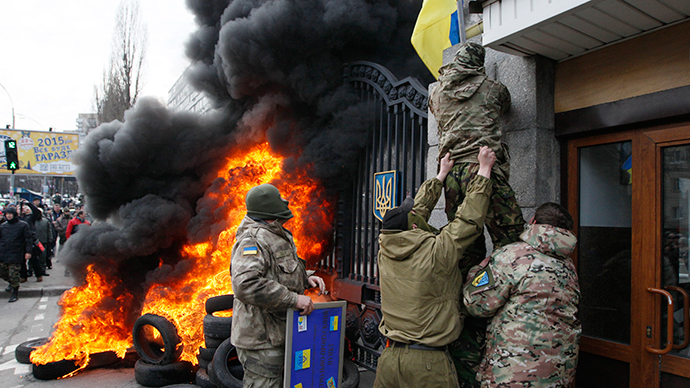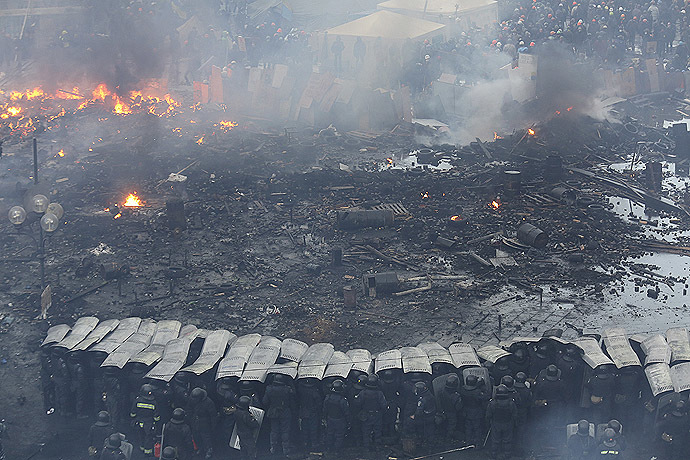‘Ukraine’s economy in backwards drive, feeds tensions and discontent’

Tuesday protests outside the president’s offices in Kiev are just a part of a bigger picture of discontent grasping Ukraine, journalist Neil Clark told RT. With the economy worsening, former Maidan allies are now angered and splitting up.
READ MORE: Hundreds trying to break into Ukraine
president’s office in Kiev
RT:Is this a small pocket of discontent or are we seeing something wider here?
Neil Clark: I think it is a part of something wider because it is not the first time this has happened. We had similar demonstrations last week in Kiev; we had President Petro Poroshenko booed when he went to Maidan. I think what that reflects is the deep underground divisions amongst the pro-putsch, pro-Maidan factions.
What brought them together 12 months ago was the determination to topple the government of the then-President Viktor Yanukovich. There were desperate groups of people ranging from neo-Nazis, far right ultra-nationalists, to, if you would like, pro-Western globalists. And now the country is under great pressure, economically things are not going well at all – Ukraine is a basket case economy, it is near bankrupt. There are swingeing cuts in public provision almost the destruction of the welfare state there. So people are very unhappy. As I said this represents a wider discontent among the pro-putsch forces that are fighting amongst themselves now.
RT:There were demonstrations outside the very same buildings a year ago. Back then it was anger at the old authorities. But they've gone now. Will this cycle ever end?
NC: Not for a long time I fear, because this violent peak started in November 2013. That was the violence used to topple the previous government, that violence was shared by the West, let’s not forget that.
There was a democratic government in Ukraine that was violently toppled. What the Western leaders, the European leaders should have said was ask people to wait until the elections this year if they wanted to get rid of the Yanukovich.

But now they encourage the violence. We had a leading US State Department official going out there to Ukraine supporting the protestors. This is what happens: we’ve got the situation now in Ukraine where Poroshenko is a very, very weak president. We’ve got this very weak coalition of interest holding the pro-putsch side together. And there is a real anger now, real division between I would say, the ultra-Nationalist wings, and less nationalistic wings, the more globalist wings. People supported the putsch because they wanted to get Ukraine in the EU and NATO. And they are clashing now with more ultra-Nationalist wings who want something different.
And on the back of all of these there is economic collapse. We’re having some awful austerity measures being introduced in Ukraine, even worse than measures introduced in Greece which cause so much social discontent. And it was a poor country anyway. But the fact is that for the vast majority of Ukrainians things are a lot off worse now than they were under Yanukovich twelve months ago. The economy is going backwards. Poverty is rising. That is the sort of backdrop to what has happened today.
Unless something radical happens in Ukraine: a change of course within the government, there has to be a peace deal with people in the East, and change at economic policies, I think things are only going to get worse. A lot of people in Ukraine are very, very angry about what is going on, and the violence which started in November is carrying on today as we see.
MORE:
The statements, views and opinions expressed in this column are solely those of the author and do not necessarily represent those of RT.
The statements, views and opinions expressed in this column are solely those of the author and do not necessarily represent those of RT.













